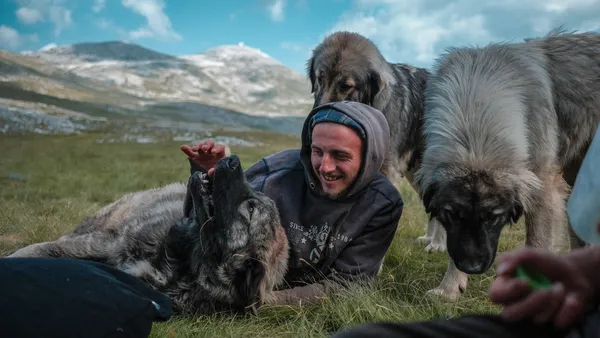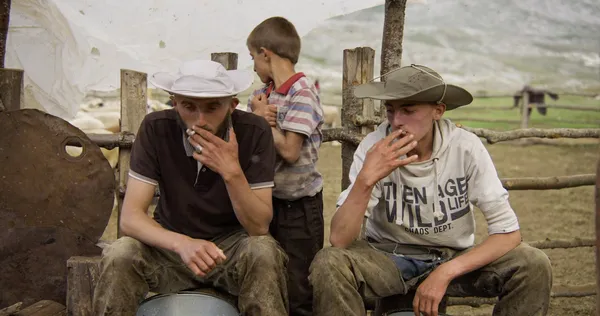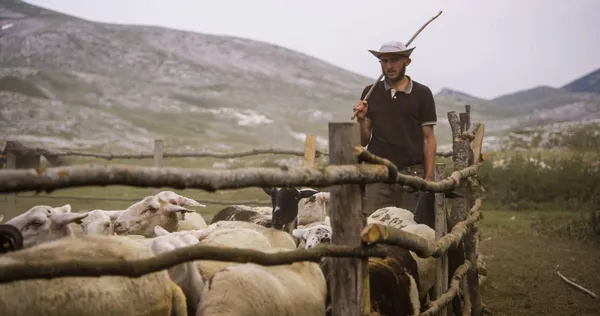 |
| Petra Seliškar: 'I grew up with several different kinds of dogs, not these dogs, these are beasts… but they are really lovable, the dogs are there to protect this whole valley.' |
Slovenian director Petra Seliškar heads the mountains of North Macedonia for her latest documentary. Shooting in an immersive observational style, she steps into the lives of a group of brothers who tend their cows and sheep at high altitude every summer, living in cabins and relying on their pack of Sharr dogs to help them and protect the livestock. The Mountain Won’t Move had its premiere at Visions du Réel in Nyon, Switzerland, and we caught up with the director to talk about the challenges of shooting in such a remote spot and the choices she made in terms of her shooting style and depiction of the family.
I gather you came across this family via a producer, perhaps you could tell me more about that?
Petra Seliškar: Yes, the story goes back to 2017. I also programme a festival called MakeDox and there was a Finnish producer Kristiina Pervilä who had this desire to see working dogs in the mountains. So we organised a horse trip. She has a farm and owns some dogs but she had heard that these Sharr dogs are super-special so she wanted to see them in their natural environment. When she came back it seemed like her face had totally changed, I thought, “Something very strong has happened to her”.
She showed me this photo, it was of Zarif, one of my characters, and he was literally the size of the dog. She said to me: “You have a story there, you have to go and find these guys.” But we couldn’t just find them, because we didn’t know which village they were from – it could have been from any side of the mountain, Solunska Glava. But she knew their surname and by that, we were lucky to find them quite fast.
Are you a dog person? Or maybe you became one through the course of the film?
PS: You cannot not be a dog person to make this kind of film. I grew up with several different kinds of dogs, not these dogs, these are beasts… but they are really lovable, the dogs are there to protect this whole valley. There’s no tourism for safety reasons because obviously these dogs can attack, you can't mix with their sheep. So it took my crew and I a while to get settled with them and every time we would go away the same problem would appear again. An interesting thing which I don't quite understand still now is that they never attacked me. It's maybe because I was the only woman or maybe I have another smell or maybe they understood the connection with the kids but they wouldn’t attack.
At what age do the little ones go up there?
Six. They go to school during the year but in the summer, it’s up in the mountains.
How long did you shoot them for and what were the challenges of shooting in the mountains and is there a reason you only shot in summer?
PS: They are not there in the wintertime because there are three to five metres (up to 16ft) of snow. It’s about 2,400m altitude (7,874ft) and the cottage is at about 2,000m (6,500ft). We were there for five summers and we started really with just me and my DOP, the two of us, then we got some funding and then we could do it with two cameras, you know, with a bigger crew of eight people Generally, the access, even though Skopje is less than 25 miles away, it takes a whole day to come up there either on horses or we had this kind of military-style high vehicle to use because there are no roads. It was incredibly difficult if there was rain and sometimes we would have to wait, so it was extremely difficult to access.
How long did you stay each time you went up?
There’s only running water for the animals. They drink it but we are not used to it so the biggest problem was to bring enough water, all the equipment and food for eight people. So we could stay for two or two-and-a-half weeks. We’d stay two weeks at the upper house and then a week down with the cows. Also, city people go crazy. There's really no other interactions than the sheep and the beautiful landscape, which we of course all got really fond of, but you can imagine having eight big men getting bored.
That must have been quite something for you. Already nearly all your protagonists are male and your crew as well. That’s a lot of testosterone to be dealing with.
PS: My friend was joking with me about this, that I am a female director who is exploring all stages of men’s growing up. As if I'm looking at the same man at different stages of growing up and adulthood with empathy.
It’s interesting you talk about that because I was reading that when this was a work in progress, you mentioned that you'd shot some footage with the boys’ grandfather as well, but obviously in the finished version you decide to stay with the younger generation. Were you ever tempted to show the older family members or to go off the mountain with them for the winter?
PS: We did shoot a lot but then it would touch on the Muslim community and how the women are and, for me, this is not this film. I’ve seen hundreds of films where there is no escape, they have to go down to the city and then, you know, this is the end of the shepherd. This was not my focus at all. Of course, I researched how the structure of the family functions, but they are alone. They are really alone. From June to October it's only the kids. So the father just brings them and that's why I didn't want to go down because then I would have to show the house, then I would have to show the school and the second and third layer.
 |
| Petra Seliškar: 'They are really friends, helping one another and understanding one another and one another’s differences' |
Were you surprised when you were shooting by the impact of technology on them in terms of the mobile phones?
PS: That happened in the last two years, they didn’t have mobile phones before. So this is a new thing for them but they adapted immediately. The funny thing is that there's no reception except on the peak, so if you want to go on your TikTok, Instagram or whatever you have to make this effort of walking 45 minutes from their little house, we just get some signal and sometimes it works sometimes it doesn't, depending on the weather. They're one click from everything that our kids see online. It's amazing that they still live pretty much the same way as they did 300 years ago, but now they have solar power panel and the internet, but the rest is pretty much the same – there's no running water, no electricity, a very ascetic way of living.
It’s a surprisingly nurturing environment. Even if they disagree they get over it very quickly.
PS: Yes, because of the lack of women, as you can see in the film, they have this tender relationship. Of course, you can also see signs of sexual frustration, which is absolutely normal. But it’s also about how they are really friends, helping one another and understanding one another and one another’s differences.
There’s a very interesting interplay between the sound and the score, can you tell me how you worked on that balance between the two elements.
PS: It was a big discussion from the very beginning, whether we need music or not because the sound is so rich and enchanting. The most important thing was that we, as an audience, feel that we are there. And sound plays a very important role in their lives.
 |
| Petra Seliškar: 'The most important thing was that we, as an audience, feel that we are there. And sound plays a very important role in their lives' |
Finally, can you tell us anything about your next project Torso Of An Old Cat, which has such a great title?
PS: Svetlana Makarovič is one of Slovenia's best known poets. She's 86 and let's call her a problematic lady. She's always been fighting politicians, opposing the Catholic Church, making scandals, all her life was one big mess – is still! What really triggered me is that she's been researching prehistoric feminism within the Icelandic Viking community and she wrote many stories connected to this. To me, this film is really about the strength of a woman. We decided to take a boat and take the 86-year-old to Iceland to see where it all started. We shot in November and we’re continuing in summer.
























